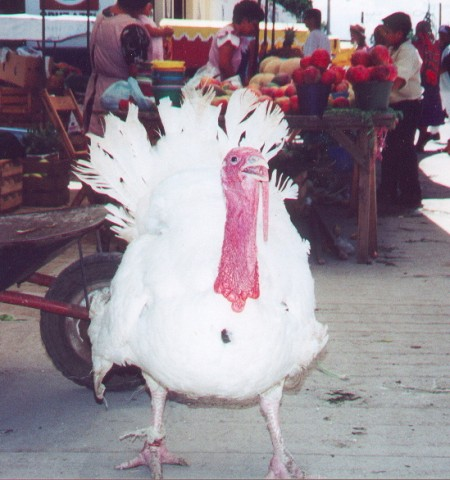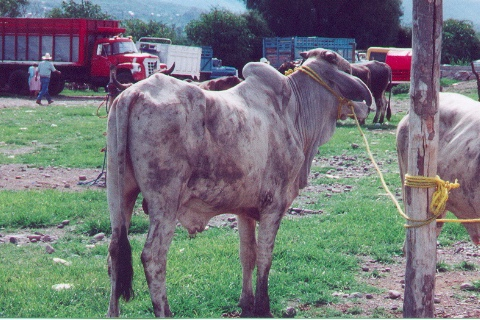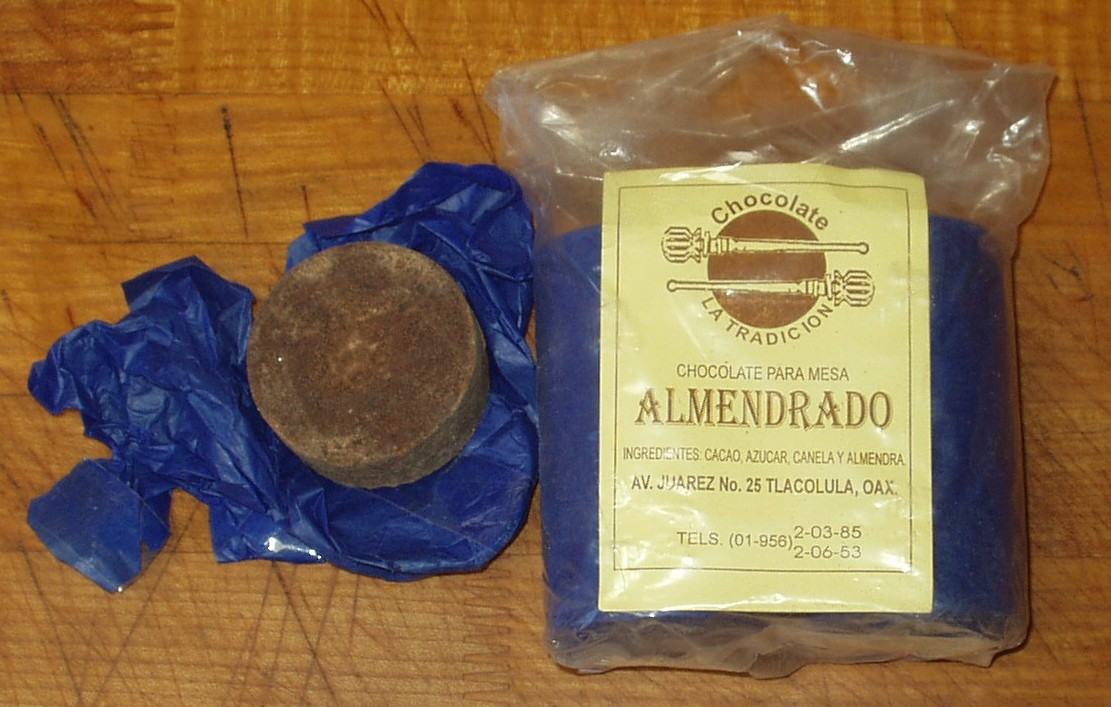S-14. Dialogue 3. At the Animal Market
Megan, a college student from San Diego, meets Juan Diego, a Zapotec from San Lucas Quiaviní who has worked in the United States, at the section of the Sunday market in Tlacolula where animals are sold. Megan is taking pictures of the animals.

Fot Teiby. A turkey for sale in the market in Tlacolula.
Click play below to hear an audio recording of the dialogue. It may be helpful to listen along the first time you read it through.
Audio recording for Dialogue 3.
| Dizhsa | Ingles | Xa Rni Buny Ra Dizh | |
| Megan: |
Zac rsily, tiu. |
Good morning, señor. |
[za’c rsìiilly, ti’u] |
| Jwanydyau: |
Zac rsily, bied. |
Good morning, señorita. |
[za’c rsìiilly, biied] |
|
A, rgweyu Dizhsa! |
So, you speak Zapotec! |
[àa’, rgwèe’yuu’ Dìi’zhsah !] |
|
|
Cali bsedyyu Dizhsa? |
Where did you learn Zapotec? |
[cali bsèe’dyyuu’ Dìi’zhsah ?] |
|
| Megan: |
Unibersida ni na San Dyegw bsedya Dizhsa. |
I learned Zapotec at the university in San Diego. |
[unibersidaa nih nàa Sann Dye’gw bsèe’dya’ Dìi’zhsah] |
| Jwanydyau: |
A — uas joz rgwezacyu Dizhsa! |
Ah — you speak Zapotec very well! |
[àaa — ua’s jo’oz rgwèe’za’cyuu’ Dìi’zhsah !] |
| Megan: |
Xtyozën yu. |
Thank you. |
[x:tyoozëhnn yuu’] |
| Jwanydyau: |
Xi cayunyyu re? |
What are you doing here? |
[xi cayuhnyyuu’ rèe’ ?] |
| Megan: |
Xnana rcaz fot xte ra budy ngual Ndua. |
My mother wants some pictures of Oaxacan turkeys. |
[x:nna’ana’ rcàa’z fo’t x:tèe’ ra bu’uhdy ngu’ahll Ndùu’ah] |
| Jwanydyau: |
A fot cabeyu buas. |
So you’re taking pictures, then. |
[àa’ fo’t cabee’ehyuu’ buahs] |
| Megan: |
Ajy. Yu a — xi cayunyyu re? |
Yes. And you — what are you doing here? |
[a’jy.yuu’ àa’ — xi cayuhnyyuu’ rèe’ ?] |
| Jwanydyau: |
Re cayunya zeiny. |
I’m working here. |
[rèe’ cayuhnya’ zèèi’ny] |
|
Re rcaza gunya imbertier muly lo ra guan sebu re. |
I want to invest money in some of these zebu bulls here. |
[rèe’ rcàa’za’ gu’unya’ imbertier mùuully loh ra gùu’ann sehbuu rèe’] |
|
| Megan: |
Na … xa gunyyu? |
Now … what are you going to do? |
[nah … x:a gùu’nyyuu’ ?] |
| Jwanydyau: |
Ra guan re ryulaza. |
I like these bulls. |
[ra gùu’ann rèe’ ryu’làa’za’] |
|
Xa rriloyu? |
What do you think? |
[x:a rrillohyuu’ ?] |
|
| Megan: |
Rcaza teiby fot xte ra guan sebu ni ryulazyu! |
I want a picture of the zebu bulls that you like! |
[rcàa’za’ te’ihby fo’t x:tèe’ ra gùu’ann sehbuu nih ryu’làa’zyuu’ !] |
| Jwanydyau: |
Yo. |
Okay. |
[yòo’] |
| Megan: |
Yzhajan buas. |
Goodbye, then. |
[yzhàaja’ann buahs] |
| Jwanydyau: |
Lezla ganyu! |
Wait! |
[lèezlàa’ gàannyuu’!] |
|
Rcaza gunya preguan yu. |
I want to ask you a question. |
[rcàa’za’ gu’unya’ pregu’uann yuu’] |
|
|
U ryulazyu nax? |
Do you like hot chocolate? |
[U ryu’làa’zyuu’ nnahx ?] |
|
|
Comedor Mary uas nizh nax ricy…. |
The hot chocolate is very good at the Comedor Mary…. |
[Comedoor Mary ua’s nìi’zh nnahx ri’cy…] |

Fot Tyop. Zebu bulls at the animal market in Tlacolula.
Speaking Politely
Megan and Juan Diego are about the same age, yet they use polite terms to each other (tiu, bied) and address each other as yu. This is customary behavior for Valley Zapotec speakers who don’t know each other. However, perhaps if Megan and Juan Diego drink hot chocolate together at the Comedor Mary they’ll decide to call each other liu.
Ra Dizh
a [àa’] 1. so; 2. what about? (used after a noun phrase)
a [àaa] ah
ajy [a’jy] yes
bied [biied] señora, señorita, ma’am (respectful term of address used to a respected person, an elder, or someone one does not know)
buas [buahs] then
guan sebu [gùu’ann sehbuu] zebu (type of ox with a hump)
joz [jo’oz] well
Jwanydyau [Jwanydya’au] Juan Diego
lezla ganyu [lèezlàa’ gàannyuu’] wait! (used to someone who would be addressed formally)
nax [nnahx] chocolate; hot chocolate
nizh [nìi’zh] delicious, good tasting (as in uas nizh nax “the hot chocolate is very good”)
rbe fot [rbee’eh fo’t] takes a picture (until Lecsyony Tseiny (13), use this verb only with formal and noun or name subjects)
rgwe [rgwèèe’] speaks (until Lecsyony Tseiny (13), use this verb only with formal and noun or name subjects)
runy imbertier muly lo [ruhny imbertiier mùuully loh] invests money in
runy preguan [ruhny pregu’uann] asks (someone) a question
rrilo [rrilloh] thinks (until Lecsyony Tseiny (13), use this verb only with formal and noun or name subjects)
tiu [ti’u] señor, sir (respectful term of address used to a respected person, an elder, or someone one does not know)
u [u] (question marker used at the beginning of question; suggests that the hearer will say “yes” to the question)
xa [x:a] what (in xa gunyyu? “what are you (form.) going to do?” and xa rriloyu? “what do you (form.) think?”; see note)
xnana [x:nna’ana’] my mother
yo [yoòo’] okay

Fot Chon. Drinking chocolate is sold in solid cakes in the market in Tlacolula.
Xiëru Zalo Ra Dizh
Normally, xa [x:a] means “how”. But in the questions xa gunyyu? “what are you (form.) going to do?” and xa rriloyu? “what do you (form.) think?”, it expresses “what”. In Zapotec, these questions would not sound good with xi, the normal word for “what”. These are both good questions to memorize, since you might want to use them in your own conversation. (Remember not to use rrilo with non-formal pronoun subjects until Lecsyony Tseiny (13).)

